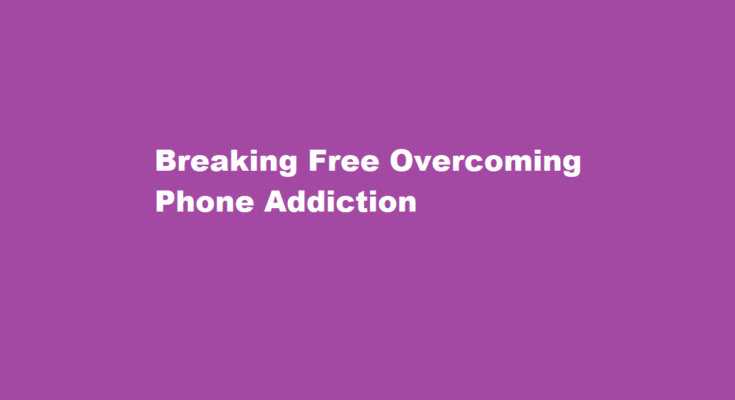In an era where smartphones have seamlessly integrated into our lives, the line between healthy usage and addiction has blurred. The constant need to check notifications, scroll through social media, and respond to messages can gradually transform into an all-encompassing habit. Phone addiction can hinder productivity, harm relationships, and affect mental health. However, with awareness and determination, it’s possible to break free from the chains of phone addiction and regain control over our lives.
Understanding Phone Addiction
Phone addiction, often referred to as nomophobia (the fear of being without a mobile device), is driven by the release of dopamine, a neurotransmitter associated with pleasure and reward, when we engage with our phones. The repetitive nature of scrolling through social media, playing games, and checking emails triggers a dopamine loop, making us crave more interaction with our devices. This cycle mimics the mechanics of substance addiction, making it challenging to break free.
Signs of Phone Addiction
Identifying the signs of phone addiction is crucial to addressing the issue. Some common indicators include
- Excessive Usage – Spending a disproportionate amount of time on your phone, often to the detriment of other activities.
- Neglected Responsibilities – Failing to fulfill work, academic, or personal responsibilities due to phone usage.
- Disturbed Sleep Patterns – Using your phone late into the night, disrupting your sleep schedule.
- Social Isolation: Preferring virtual interactions over face-to-face communication, leading to social withdrawal.
- Anxiety and Restlessness – Feeling anxious or restless when separated from your phone.
- Constant Checking – Frequently refreshing apps for updates or notifications.
- Diminished Focus: Finding it difficult to concentrate on tasks without the urge to check your phone.
Steps to Overcome Phone Addiction
Breaking free from phone addiction requires a combination of self-awareness, behavioral changes, and adopting healthy habits. Here are some effective steps to help you regain control over your phone usage
- Digital Detox – Start with a short digital detox period. Gradually increase the duration as you become more comfortable. Use this time to engage in offline activities, reconnect with hobbies, and spend quality time with loved ones.
- Set Clear Goals – Define specific goals for reducing phone usage. Whether it’s limiting screen time, designating phone-free zones, or scheduling breaks from your device, having clear objectives provides direction.
- App Management – Identify apps that consume most of your time and attention. Consider deleting or limiting the usage of these apps. Utilize app usage trackers to monitor and control your screen time.
- Notifications and Alerts – Turn off non-essential notifications to minimize distractions. Designate specific times to check and respond to messages and emails.
- Engage Mindfully – Practice mindfulness when using your phone. Before opening an app, ask yourself if it’s essential at that moment. This simple pause can reduce impulsive phone checks.
- Offline Activities – Rediscover offline hobbies and activities that bring joy and fulfillment. Engaging in physical exercise, reading, or spending time outdoors can divert your attention from your phone.
- Establish Routines – Create daily routines that prioritize tasks and activities without excessive phone usage. This structure can help break the habit of mindless scrolling.
- Accountability Partner – Share your goal of overcoming phone addiction with a friend or family member. They can provide support, encouragement, and hold you accountable for your progress.
- Utilize Phone Features – Many smartphones offer features to monitor and limit screen time. Set up screen time tracking, app limits, and “Do Not Disturb” modes to help you stay focused.
- Focus on Relationships – Strengthen real-life connections by engaging in face-to-face conversations and activities. Building meaningful relationships offline can reduce the need for constant virtual interaction.
Celebrating Progress
Overcoming phone addiction is a journey that requires patience and persistence. Celebrate even the smallest victories along the way. Recognize the moments when you successfully resist the urge to pick up your phone and acknowledge the positive impact on your daily life.
Frequently Asked Questions
What is the main cause of phone addiction?
Why is it addictive? Psychologists liken cell phones to slot machines. Dopamine is a chemical in the brain that induces happiness. It is released every time we receive a message, alert, notification, etc., on our phones.
Why should we stop phone addiction?
Smartphone or internet addiction can also negatively impact your life by: Increasing loneliness and depression. While it may seem that losing yourself online will temporarily make feelings such as loneliness, depression, and boredom evaporate into thin air, it can actually make you feel even worse.
Conclusion
Phone addiction may seem insurmountable, but with the right strategies and a determined mindset, it’s possible to regain control over your device usage. By understanding the underlying causes of addiction, recognizing the signs, and implementing mindful changes, you can break free from the chains of constant digital engagement. Embrace a life enriched by genuine connections, meaningful activities, and a healthier relationship with technology. Remember, you hold the power to reclaim your time and attention from the grasp of your phone.
Read Also : Overcoming Phobias A Journey to Fearlessness



